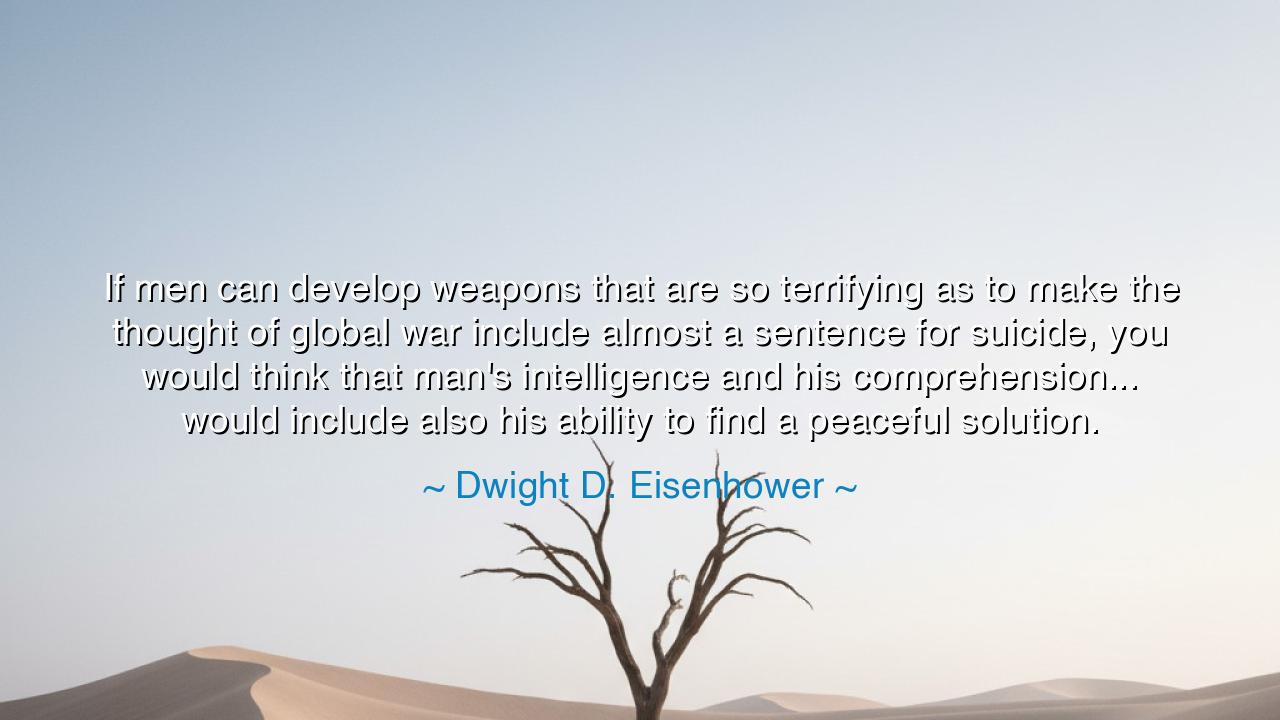
If men can develop weapons that are so terrifying as to make the
If men can develop weapons that are so terrifying as to make the thought of global war include almost a sentence for suicide, you would think that man's intelligence and his comprehension... would include also his ability to find a peaceful solution.






In this solemn and piercing reflection, Dwight D. Eisenhower — a soldier turned statesman, a man who had seen the full horror of war — spoke to the paradox of human progress. “If men can develop weapons that are so terrifying as to make the thought of global war include almost a sentence for suicide, you would think that man’s intelligence and comprehension would include also his ability to find a peaceful solution.” These words were not the musings of a dreamer, but the lament of a realist who had walked among the ruins of human pride. He had witnessed how the same brilliance that forged victory in battle could also forge the instruments of annihilation. His message, carved from both reason and sorrow, was this: that knowledge without wisdom is the most dangerous form of ignorance.
Eisenhower’s quote was born from the atomic age, when humanity stood trembling at the edge of its own destruction. The world had just survived the fires of World War II, only to awaken to a new and more terrible dawn — the mushroom cloud rising over Hiroshima and Nagasaki. In that blinding light, man saw his own shadow cast across eternity. For the first time, human beings possessed the power to end all life, to turn the planet itself into ash. Eisenhower, once Supreme Commander of Allied Forces, carried both pride in human ingenuity and horror at what it had unleashed. His question — simple yet profound — echoes still: if we are wise enough to build such terrible power, why are we not wise enough to choose peace?
Consider the story of the Cuban Missile Crisis of 1962, when the world stood on the brink of nuclear war. For thirteen days, humanity held its breath as two great powers, armed with doomsday weapons, faced each other in a contest of will. Yet in that peril, something sacred awoke — the realization that war had lost all meaning in an age of mutual destruction. Through dialogue, restraint, and the courage to step back, President Kennedy and Premier Khrushchev found a peaceful path. It was proof that even at the height of danger, reason could prevail over rage, and diplomacy could silence the drums of war. In that moment, mankind glimpsed the truth of Eisenhower’s vision: that the ultimate victory is not conquest, but self-mastery.
But history also bears witness to our repeated failures to learn. Each generation has its own arms race — if not of bombs, then of power, greed, or ideology. We build stronger weapons, sharper tools, faster machines, and yet the heart of man remains ungoverned. Eisenhower’s grief was not that we lacked intelligence, but that we lacked compassion. He saw that comprehension without conscience leads not to advancement, but to ruin. For intellect can design engines of war, but only empathy can sustain peace. The measure of a civilization is not what it can destroy, but what it chooses to preserve.
Even in the ancient world, the wise saw this truth. The philosopher Heraclitus once wrote that war is the father of all things — but he spoke of inner conflict, the struggle of opposites that gives rise to harmony. True strength, as the ancients knew, lies not in domination but in balance. When a man conquers another, he wins an empire; when he conquers himself, he wins eternity. Eisenhower, standing in that lineage of wisdom, called humanity to rise above the primitive instinct of violence and embrace the higher art of understanding. He was not merely condemning weapons — he was urging the birth of a more mature species.
The lesson, then, is clear and enduring: wisdom must catch up with power. Each of us holds in our hearts the same choice that nations face — to build or to break, to heal or to harm. Peace begins not in treaties but in thoughts, in words, in the quiet discipline of compassion. If mankind can invent machines that fly to the stars, surely he can learn to live without hatred. Let each person become a small ambassador of reason, refusing to fuel the fires of division, speaking instead with the calm authority of one who has glimpsed the cost of destruction.
And so, children of tomorrow, remember this: intelligence is a tool, but wisdom is a destiny. The gate to peace stands open only to those who understand that the truest victory is the preservation of life itself. Let every generation be wiser than the one before it. Let every conflict end one step closer to harmony. For when humanity learns to wield its power with love, the sword will finally fall from our hands — and we will stand unarmed, yet unconquerable, before the dawn of eternity.






AAdministratorAdministrator
Welcome, honored guests. Please leave a comment, we will respond soon